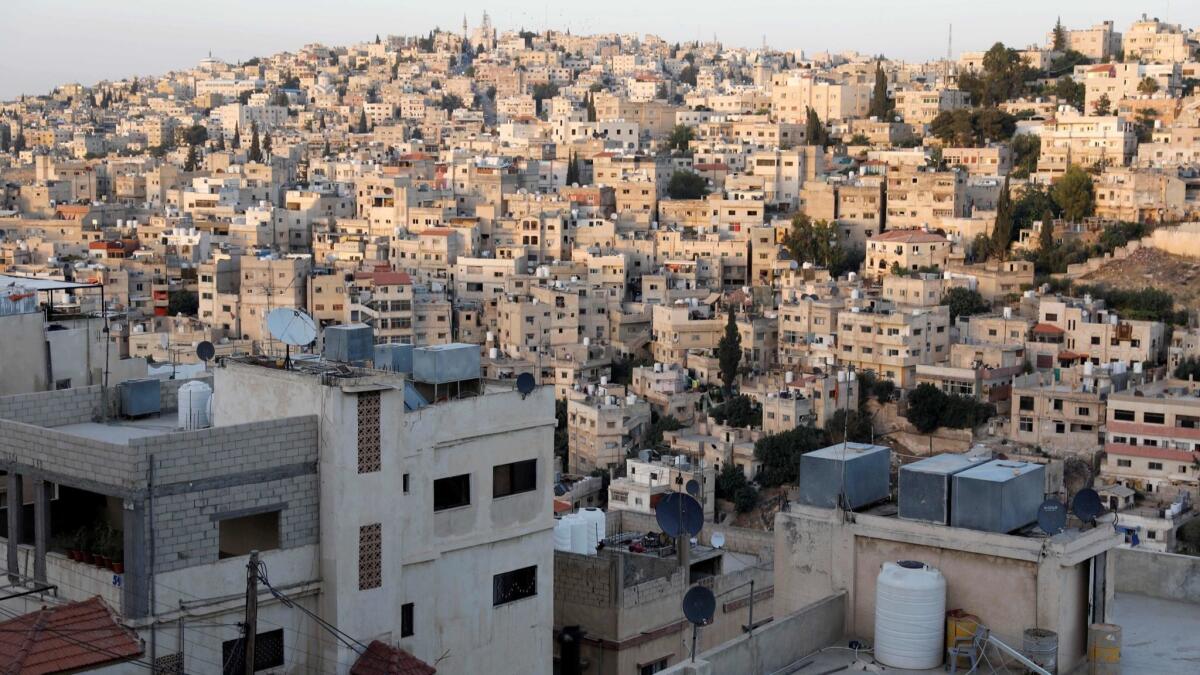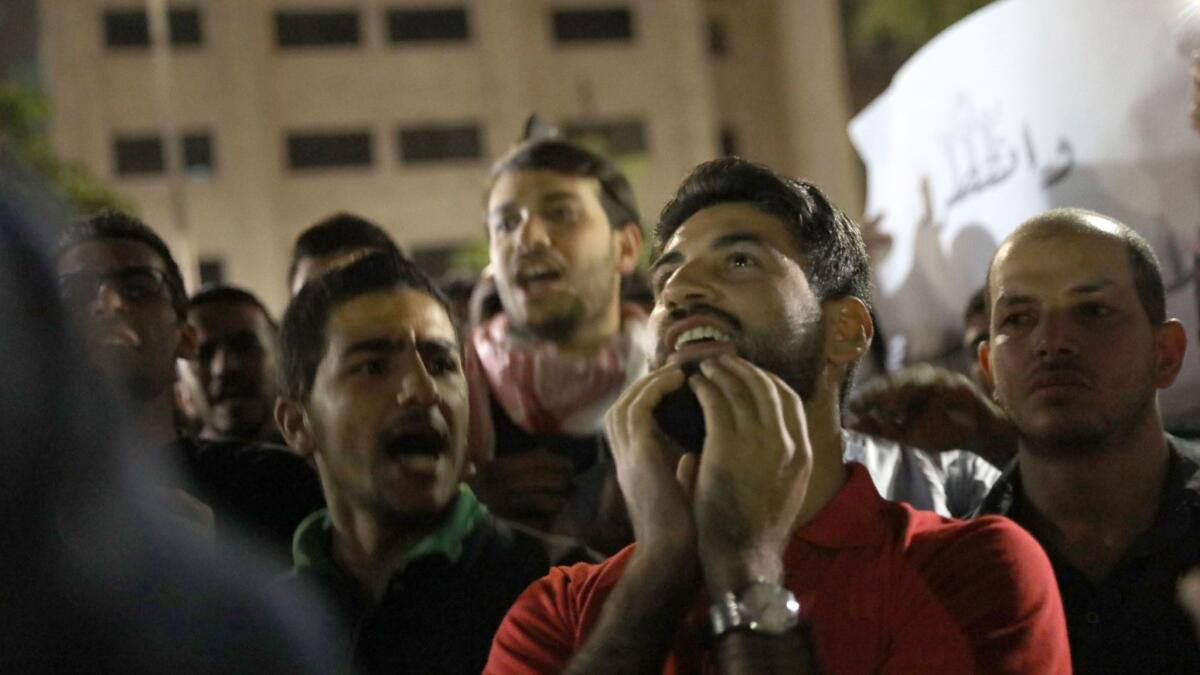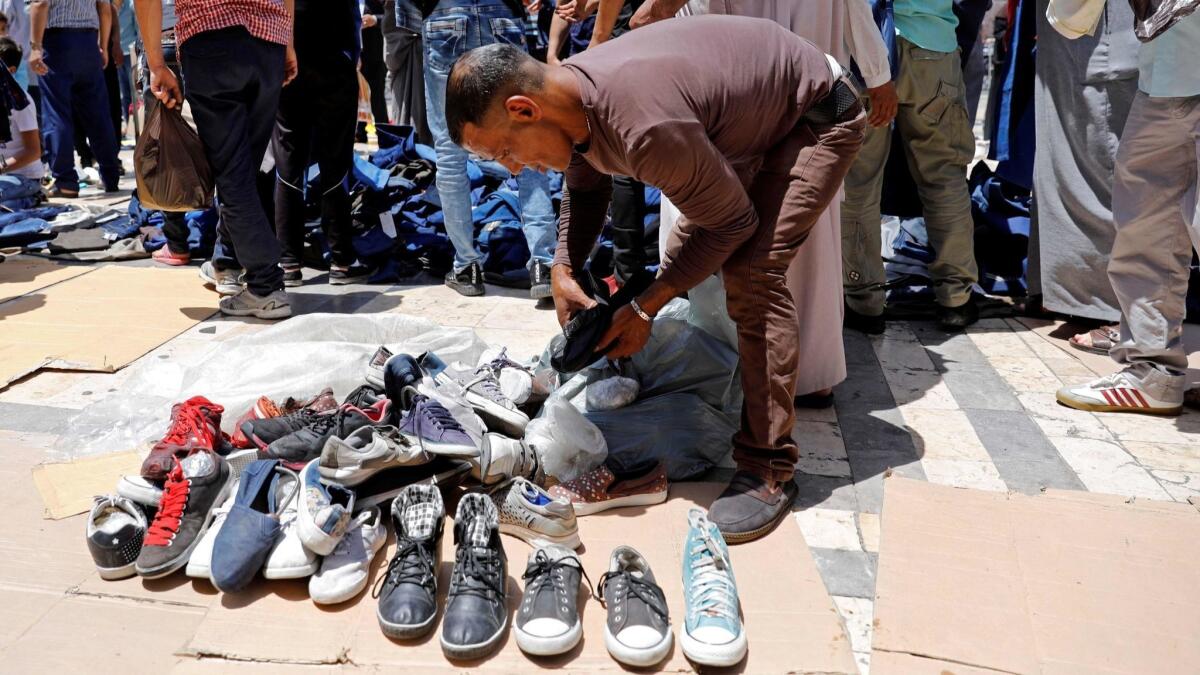‘We are trapped,’ one Jordanian says as the country weighs tough choices from the IMF

- Share via
Reporting from Zarqa, Jordan — To walk through Zarqa, the rundown industrial heart of Jordan and its second largest city, is to see the country’s problems in miniature.
Here, cars roll carefully over potholed roads, while pedestrians pick their way around garbage that municipal cleaners clear every so often. On the city’s outskirts, industrial waste and sewage gather in a foul-smelling, black-colored pit locals have dubbed “The Pepsi Pool.”
“We’ve gotten used to sewage, to garbage. … All this has become routine,” one public schoolteacher living in Awajan, a drab, low-income suburb of this city, said in an interview Thursday.
“And they still want more taxes?” said the soft-spoken Sameh Hyasaat, 36.
Hyasaat was referring to a controversial tax bill that has become a symbol of what many have called a “policy of impoverishment” exercised by the government against the country’s working class.
That sense of anger and injustice, exacerbated by a series of austerity measures, drove tens of thousands into the streets of Jordan last week.

King Abdullah II, the country’s monarch, not only canceled the increases but also dissolved the government of now former Prime Minister Hani Mulki.
By Thursday, the newly appointed prime minister, Omar Razzaz, pledged that his Cabinet’s first act would be to withdraw the troublesome tax bill.
But the victory is a temporary reprieve: With state coffers running on empty, and faced with a bloated public sector as well as pressure from its creditors, the consensus is that Razzaz can do little more than delay the unpopular measures that felled his predecessor.
“It seems we are trapped,” said Jawad Anani, an economist who had served as the country’s deputy prime minister for economic affairs in past governments.
Nowhere are the economic ills plaguing Jordan more apparent than in Zarqa.
Asked about the city’s financial health, Khaled Othman, the office manager of Zarqa’s mayor, winced before delivering a recitation of complaints.
“We have a debt of almost $50 million. Our annual budget is $46 million. The deficit and the debt means we can’t offer most services,” he said.
The municipality had pared down expenditures, canceling funding for cultural clubs and national celebrations, while directing money at critical issues such as street repair and cleaning. Still, it’s barely enough.
Meanwhile, Othman said, 88% of the municipal budget goes for salaries.
“The law mandates we spend no more than 50, maybe 55% at the most,” he said. “But we employ 4,800 people here. And I can tell you, we don’t need two-thirds of them.”
Not all of Jordan’s problems are self-created; many are a function of its neighborhood.
When the Arab Spring uprisings first began in 2011, Jordan seemed primed to share the same fate as Tunisia, Egypt, Libya and Syria, where long-entrenched governments fell before chaotic revolutions.
But the kingdom remained stable even as Syrians, fleeing the war raging in the country, streamed across the border into Jordan by the hundreds of thousands.
Still, the regional strife kept tourists away, and merchants lost their traditional export routes through Syria and Iraq.
Jordan also was squeezed by the loss of its traditional sources of support.
In the past, the kingdom, an arid country with few resources, had relied on the largesse of both the U.S. and Gulf countries such as Saudi Arabia. The U.S., which views Jordan as a top regional ally in the fight against Islamic State, had upped its grant to the kingdom to more than $6.4 billion earlier this year.
But Jordan’s refusal to join Saudi Arabia in its war in Yemen, and reported differences regarding the Israeli-Palestinian conflict, meant that no money was forthcoming from Riyadh.
Meanwhile, the size of the country’s debt, in proportion to its economy, skyrocketed by more than 30% by the time Mulki came to power in 2016.
He tackled the slide toward insolvency by overseeing a series of unpopular moves, including the lifting of subsidies.
Fuel prices have inched upward and now are 50% more expensive than in the United States. Electricity costs are up 55%, and the price of bread has doubled. The hikes made Amman the Arab world’s most expensive city in 2017, according to the Economist magazine.

The proposed tax increase was another component in a series of fiscal reforms imposed by the International Monetary Fund, which in 2016 gave Jordan a three-year line of credit worth $723 million.
It aimed to lower the minimum taxable income, more than doubling the number of people subject to taxes. But it proved to be one measure too many. Protesters from the country’s middle and lower classes came together in a rare display of anger.
Led by 30 labor unions, people called for the law’s withdrawal. They raised signs reading #Manaash, meaning, “We don’t have [money].”
When Mulki refused, the protests called for the government’s dissolution, though they stopped short of calling for the downfall of King Abdullah.
Despite the victory celebrations, the anger persists. In Zarqa, it is easy to see why.
With less than a week until the end of the Muslim holiday of Ramadan, markets normally would be flooded with shoppers. Not so this season, said Yasser Qadri, 35, the owner of an electronics shop in Zarqa’s downtown district.
“People have no money. There’s no movement in the market. Normally you couldn’t even find a place to stand, but look around,” he said, giving a dismissive wave around his empty shop.
Abdullah Hyasaat, Sameh’s 29-year old brother and a former policeman who now works as a merchant, agreed.
“You tell me about Syria, that we don’t want to become like them with a revolution? Here, it’s worse than Syria. We have security, yes, but everything else is worse,” he said.
Many complain about government corruption, an endemic problem that costs Jordan vast sums. Growth, meanwhile, has stagnated, stubbornly hovering around a meager 2% to 3% since 2011.
The IMF’s demand for fiscal reform is untenable, Anani said.
“You can’t reconcile ... fiscal reform and growth,” he said, adding that he hadn’t seen a single new company appear on Amman’s stock exchange for almost a decade.
The country’s only hope, Anani said, is to negotiate a new deal with its creditors, putting them off while focusing on restructuring and development, not fiscal reform.
On Thursday, the IMF said it would work with Jordan on a review of its loan program.
What won’t work, Anani said, is putting extra burdens on people. “We need to change the model. It won’t work any other way,” he said.
On Saturday, a glimmer of hope appeared. The Saudi royal court issued a statement saying it would join Kuwait, the UAE and Jordan in a summit in Mecca, Saudi Arabia, on Sunday.
King Salman, the court said, called the meeting to “discuss means of supporting Jordan to overcome its current crisis.”
Bulos is a special correspondent.
Twitter: @nabihbulos
More to Read
Sign up for Essential California
The most important California stories and recommendations in your inbox every morning.
You may occasionally receive promotional content from the Los Angeles Times.











